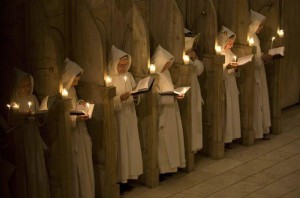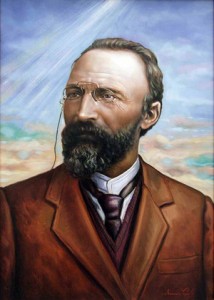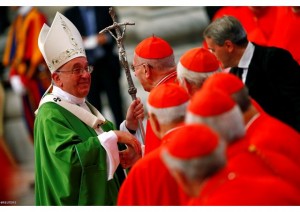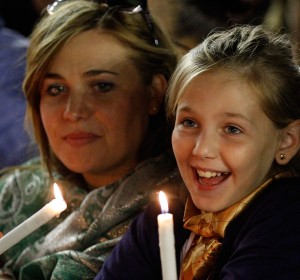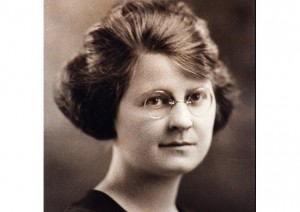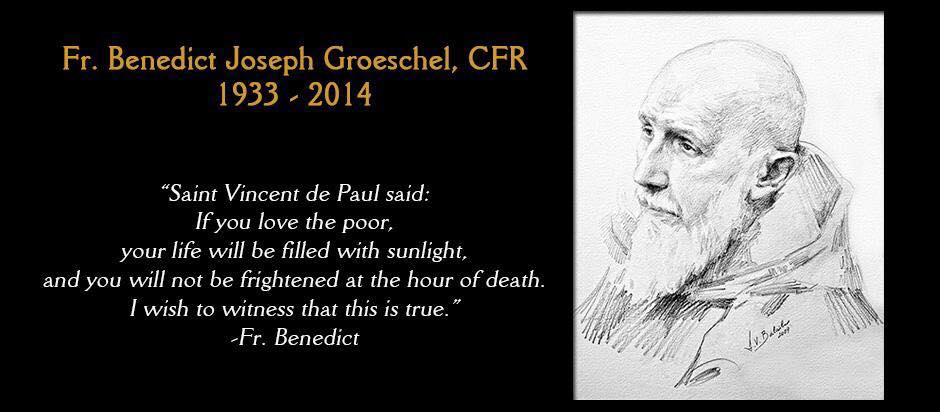 Cardinal Francesco Coccopalmerio was chosen by Pope Francis to head a new commission for the study simplifying of the annulment process. The Cardinal is the President of the Pontifical Council for Legislative Texts; he spoke with Salvatore Cernuzio of ZENIT and the text of the interview was released on ZENIT on October 3, 2014.
Cardinal Francesco Coccopalmerio was chosen by Pope Francis to head a new commission for the study simplifying of the annulment process. The Cardinal is the President of the Pontifical Council for Legislative Texts; he spoke with Salvatore Cernuzio of ZENIT and the text of the interview was released on ZENIT on October 3, 2014.
The Extraordinary Synod of Bishops begins tomorrow but tonight in Rome there is a vigil service presided over by the Pope and a packed St Peter’s Square. He set the tone of wanting the Church at her various levels oriented toward the Lord in prayer.
The interview is not terrifically insightful or revealing of “possible” changes to our pastoral practice with regard to marriage and family life, or about giving a new theological anthropology, but it is a text that ought to garner some attention not only for experts but for those who work in pastoral contexts like the parish and universities. It follows:
ZENIT: The Synod is already at our door. With what state of mind do you approach this great Assembly? What are your hopes, but also your fears?
Cardinal Coccopalmerio: There is, certainly, some concern because we will be addressing delicate questions, on which opinions are diverse. The fear, which is justified, is that there will be some reason for opposition. However, I believe that, if each one of us says freely and sincerely what he thinks and others listen to him with patience and with the desire to compare and reflect further, all will be well. In this connection, I trust in the help of the Holy Spirit, that He may illumine our minds and, above all, make us open to one another.
ZENIT: The international media has given much attention to the subject of the Sacraments for civilly remarried divorced persons, theorizing in fact that there will be “clashes” and angry debates during the Assembly between conservative and progressive factions. What do you think?
Cardinal Coccopalmerio: I think the subject of Communion for remarried divorced persons is important, because there are persons who live experiences of suffering and, therefore, expect a word of light and comfort from the Church. However, obviously, this isn’t the only topic: there are many others that, perhaps, are more important. The real topic, the main one, is to make the beauty of marriage and the family understood, despite the fact that such an adventure also entails effort. If the Synod succeeds in giving, especially to young people, a more beautiful, more enthusiastic sense of marriage and the family, it will certainly have achieved the most important result. Then as well, of course, it will have to address “burning” issues, but it will do so in a wider and more serene atmosphere.
ZENIT: In regard to these burning issues, how do you define them? What is your position? In which of the two “factions,” if we can so describe them, are you?
Cardinal Cocopalmerio: I cannot anticipate here my intervention in the Synod. I only think that, following the Lord’s Gospel and it being a question of so many persons living in painful situations, we are called to commit ourselves to give satisfying and adequate answers to the needs of today.
ZENIT: Among the topics connected to the Synod are also the juridical and canonical implications of the matrimonial bond. In fact last week Pope Francis instituted a study commission for the annulments process, and made you a member. Should we describe this as a strategic move of the Pontiff on the eve of the Synod?
Cardinal Coccopalmerio: I would rather say an intelligent move that put to the fore one of the questions that the Synodal Assembly will certainly be working on. From many sides it has been suggested that the procedures be simplified to come to the declaration of an eventual matrimonial nullity. Hence this Commission works outside of the Synod but also in service of the Synod, being able to give it a notable contribution. The Pope did well in instituting it.
ZENIT: Isn’t there the risk that with a simplification of the procedures of matrimonial nullity the evangelical principle of the indissolubility of the Sacrament will be questioned?
Cardinal Coccopalmerio: The procedure for the declaration of matrimonial nullity serves to declare if a marriage is valid or not. Therefore, it isn’t a procedure for the annulment of the matrimonial bond but it serves simply to see, to confirm, to take into account the validity or invalidity of the bond. If the bond is not valid, there is the pronouncement of the nullity of the marriage; if it is valid, its existence is confirmed. It is, therefore, a procedure oriented to seeking the truth: does this bond exist or not?
The procedure for the declaration of matrimonial nullity does not put in question the principle of the indissolubility of marriage: it tends only to examine if in a concrete case, there is or is not a marriage. If the bond was never born, it is no longer about dissolubility or non-dissolubility, but about the non-existence of matrimony. Therefore, even if the procedure is simplified, it must never fail, however, in the finality of establishing the reality. And if the simplification impedes coming to knowledge of the reality it would not be good.
ZENIT: On the practical plane, there is an increase in requests for nullity. Almost 50,000 marriages in the world celebrated in church have been annulled, of which more than 2,400 alone were in Italy. Will it be possible, with this Commission, to meet these requests?
Cardinal Coccopalmerio: I don’t have the statistics, therefore I cannot know how to reply. However it seems to me that the current language is erroneous: marriages are not “annulled.” What is declared is only that the bond does not exist because it was never born, in as much as at the moment of the celebration an essential requisite was lacking, as happens, for instance, when one who marries excludes the indissolubility of marriage.
ZENIT: In the Instrumentum laboris of the synod, one reads that the Assembly will study a more valid pre-matrimonial pastoral ministry but also a strategy to support young couples after the Sacrament. In your opinion, up to now has this type of ministry been a lacuna in the Church?
Cardinal Coccopalmerio: The pastoral intention is very important. The preparation for marriage should be carried out with passion and diligence so that the future spouses are supported in a conscious and joyful way. Perhaps in some parts of the world this ambit is not taken care of or not sufficiently taken care of. I am certain that the Synod will insist on this point and will be able to renew methods and structures. Even more important, then, is post-matrimony, the follow-up, that is, the new couples that have met, for instance, with difficulties in their matrimonial life which they didn’t have as engaged couples. It is necessary to support couples, especially in their difficult moments in which there are disillusions, relational difficulties caused, for instance, by reasons of work or health.
ZENIT: I would like to hear your thought on unions between persons of the same sex. On other occasions, you have stated that homosexuals are not condemned and, if there are also stable unions between them, what is important is that they not be confused with the family and with matrimony. Can you clarify this concept?
Cardinal Coccopalmerio: Matrimony is a precise reality; it is the union between a man and a woman, which is stable, open to generation: it is a concept of matrimony to be maintained with commitment and honesty. Therefore, the other unions cannot in all honesty be called matrimony. And when we say matrimony we also say family. The problem, therefore, is not so much not to condemn unions between persons of the same sex: every person, in fact, has his conscience and, therefore, makes his choices. The problem is to see if legislation can include in its ordering forms of homosexual union especially in relation to adoption.
ZENIT: What is your point of view on this issue?
Cardinal Coccopalmerio: I have questioned myself many times in this regard. By tendency I am decidedly opposed to the possibility of a homosexual couple adopting children. I have much difficulty with this, because one thing is the choice that two persons can make of their life, of their relationship, another is to have this choice carried out on someone outside, little persons, incapable of deciding. If I were a lawmaker I think I would prohibit it.
ZENIT: What are the greatest risks?
Cardinal Coccopalmerio: First of all, those of an anthropological nature, because — let’s say it clearly – one can discuss everything, but spontaneously one feels that the education of a child is not to be entrusted to a homosexual couple. However, here we are entering in a very complex matter in which I don’t feel competent. I say spontaneously that the adoption of children by same-sex couples is certainly something foreign to my conviction. From the legislative point of view, I confirm, I would not permit it.
ZENIT: So many, however, object that in face of cases of abandonment or mistreatment of minors, it would be better if a child was received by two persons, even of the same sex, who in any case can guarantee him/her affection and support …
Cardinal Coccopalmerio: Yes, certainly, when faced with the reality of street children, totally abandoned, as the many I have seen, and they are an excruciating sight, perhaps the thought comes that a “homosexual couple is better.” But let’s be clear: it would be as if saying that in face of a great evil a lesser evil is preferable. Deep down something remains that is difficult to accept.
ZENIT: Can there ever be an opening of the Church in this regard?
Cardinal Coccopalmerio: I don’t think the Church could ever accept the legitimacy of a homosexual union from an objective point of view. The Church can respect this choice of life, presupposing that it was made in full good faith. It is something else, however, to say that this union is objectively something good and acceptable.
ZENIT: So many people, perhaps misunderstanding, expect great openings on the part of Pope Francis. In connection with the Pontiff, it came to my mind that about two years ago, on the eve of the March Conclave, you hoped in an interview that “the new Pope would be first of all a witness of the Faith, capable of listening and of dialogue; that he be able to bring love and joy to the world; but that he also be able to evaluate his collaborators and appoint in the Papal Curia personnel of very high technical and spiritual formation.” In light of what Bergoglio has done in these months of pontificate, has your hope been heard?
Cardinal Coccopalmerio: Yes, absolutely. Among the many things that could be said of Pope Bergoglio, one is obvious above all: he loves persons, he makes each one feel that he considers him important, that he listens to him and, therefore, appreciates him. By expressing love, he gives joy.
ZENIT: Are you pleased with the reform of the Curia that is underway?
Cardinal Coccopalmerio: Let’s keep in mind that we are still in one phase – let’s say – of the work in progress. Moreover, the Holy Father came from far away; he had not lived in Rome and must still enter in certain mechanisms and certain structures of the Curia.
ZENIT: However in the C9, the Council of Cardinals instituted by the Pope to help him in the government of the Church, are there not truly “curial” names …
Cardinal Coccopalmerio: Yes, it’s true. However, the nine Cardinals give pastoral guidelines that are then taken by experts and translated into effective. This is the praxis. Moreover, there is a clarification to be made …
ZENIT: Which one?
Cardinal Coccopalmerio: That the reform of the Curia must start from a specific presupposition: the Curia is made up of persons, of Dicasteries, that is, of subjects each one of whom carries out an activity of the Pope. The Holy Father has to carry out so many tasks for the government of the universal Church, but he can’t do everything alone, because he doesn’t have the time or the specific competencies. Therefore, every “subject” – at present we have 26 Dicasteries in the Curia (Congregations, Pontifical Councils, Tribunals, Offices) – helps the Pope to carry out a task. And he has more or less value to the degree that he carries out this activity and does it well. The whole reform of the Curia must rotate around this: what activity of the Pope does this dicastery carry out? Does it do it well?
ZENIT: And if it doesn’t do it well?
Cardinal Coccopalmerio: It can also be closed. If there are Dicasteries that carried out an activity of the Pope in the past but that today are no longer necessary, then they can be abolished.
ZENIT: Therefore, in this case also, are we moving towards a strong simplification?
Cardinal Coccopalmerio: Yes, a simplification could be exercised but, if we follow the criterion of what the Pope needs today, there could even be an enlargement. In the sense that, if the Holy Father intends to carry out an activity, of which there was no need before, he can institute a new organism. It’s the case, for instance, of the Commission for the Protection of Minors.
ZENIT: One last question. The Synod will conclude on Sunday, October 19, the day in which Pope Francis will beatify Paul VI. Were you able to know Pope Montini in person?
Cardinal Coccopalmerio: Yes. It was he who ordained me a priest. I was one of the last 30 priests ordained by Cardinal Montini before he left the Diocese of Milan, so I was always united to him by bonds of spiritual sonship.
ZENIT: What memory do you have in particular of the Pontiff?
Cardinal Coccopalmerio: More than as Archbishop I remember him as Pope. I like to describe his figure with a phrase that a Cardinal once said and that always left me astounded: “Montini believes in God.” See, he was someone who believed in God, therefore in man and therefore he loved God and people.
ZENIT: Are you happy to see him beatified?
Cardinal Coccopalmerio: Obviously very much. I would like to see him canonized soon …
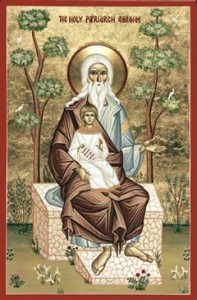 The feast of Abraham recalls the person, our father in monotheistic Judaism who opened the door to human faithfulness before the holiness of a God who revealed Himself to humanity in a new way. The holy Patriarch’s liturgical memorial is not celebrated in the Latin Church but in the Byzantine Church does so today. He is, however, recalled in the Roman Canon of the Mass and in several of the prayers used during the year. What we believe, and why we pray is expressed in the hymn texts of the Divine Liturgy. By looking at the liturgy we know what we believe and how to live. Here, the holy Patriarch Abraham is extolled a light to follow and a man of God who mediates for humanity before the Throne of Grace.
The feast of Abraham recalls the person, our father in monotheistic Judaism who opened the door to human faithfulness before the holiness of a God who revealed Himself to humanity in a new way. The holy Patriarch’s liturgical memorial is not celebrated in the Latin Church but in the Byzantine Church does so today. He is, however, recalled in the Roman Canon of the Mass and in several of the prayers used during the year. What we believe, and why we pray is expressed in the hymn texts of the Divine Liturgy. By looking at the liturgy we know what we believe and how to live. Here, the holy Patriarch Abraham is extolled a light to follow and a man of God who mediates for humanity before the Throne of Grace.